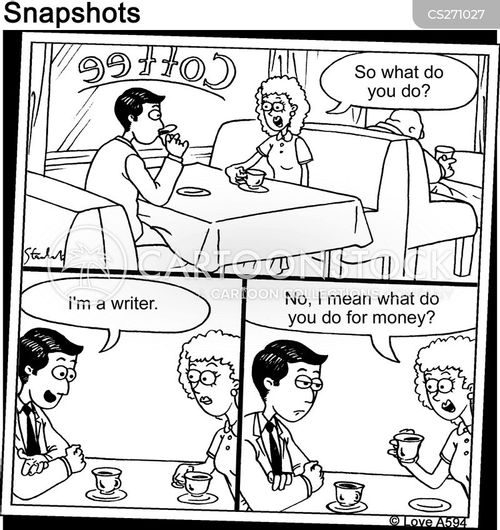Paul Whybrow
Full Member
Mark Twain popularised the phrase: "There are three kinds of lies: lies, damned lies, and statistics."
It's never been truer than when referring to authors' incomes.
Some of you may have seen the doom & gloom report from the Authors Guild in America, which claims that author income fell 42% from 2009 to 2018.
Authors Guild Survey Shows Drastic 42 Percent Decline in Authors Earnings in Last Decade - The Authors Guild
One of the problems with this sort of report is that it's seized on by the media and publicised without comment or appraisal. The veracity of any survey depends on who is asked for their opinion. Thankfully, Nate Hoffelder has got his head screwed on right, and in his excellent Digital Reader blog, points out the inaccuracies of the methodology used by the Authors Guild:
The Authors Guild Claims Author Income is Down | The Digital Reader
(Read the Comments at the bottom, in which the AG's Executive Director responds and Nate Hoffelder replies)
If a survey is biased towards a certain age group or publishing method, then the results will be skewed. To add to the problems of getting an idea of what the real picture is with digital publishing vs traditional publishing, publishing a book on Amazon doesn't require an ISBN and as they don't report their sales figures, there's no way of accurately knowing how many books are sold via the biggest book dealer in the world!
Are ebooks dying or thriving? The answer is yes
The only thing that's certain, is that relying on book writing as a sole source of income is foolish. Even well-known authors who've won literary prizes need to work other jobs, often teaching university students about how to become a writer! The success stories of debut authors that the media like to print are wildly misleading, with mention of six-figure advances, film options and three book deals.
There are very few modern-day authors who've become millionaires. Perhaps it's not surprising, though I still find it disturbing, that the wealth of authors increasingly reflects a society where 1% own 82% of the world's money. In the UK 1% of writers account for one-third of book sales:
Earnings soar for UK's bestselling authors as wealth gap widens in books industry
My own approach to having a writing career was that I knew I was going to be in for a long slog, as I had much to learn, so I resigned myself to no income for several years. I've made less than $50 in eBook sales since 2013. I could make more money panning for gold in Cornwall's streams...the county is riddled with old mines.
Long-term ambitions for any writer can only come to fruition with hard work, perseverance and a large amount of good luck. I recently saw a quote from W. Somerset Maugham which sums up my desire:
It is not wealth one asks for, but just enough to preserve one's dignity, to work unhampered, to be generous, frank and independent.

It's never been truer than when referring to authors' incomes.
Some of you may have seen the doom & gloom report from the Authors Guild in America, which claims that author income fell 42% from 2009 to 2018.
Authors Guild Survey Shows Drastic 42 Percent Decline in Authors Earnings in Last Decade - The Authors Guild
One of the problems with this sort of report is that it's seized on by the media and publicised without comment or appraisal. The veracity of any survey depends on who is asked for their opinion. Thankfully, Nate Hoffelder has got his head screwed on right, and in his excellent Digital Reader blog, points out the inaccuracies of the methodology used by the Authors Guild:
The Authors Guild Claims Author Income is Down | The Digital Reader
(Read the Comments at the bottom, in which the AG's Executive Director responds and Nate Hoffelder replies)
If a survey is biased towards a certain age group or publishing method, then the results will be skewed. To add to the problems of getting an idea of what the real picture is with digital publishing vs traditional publishing, publishing a book on Amazon doesn't require an ISBN and as they don't report their sales figures, there's no way of accurately knowing how many books are sold via the biggest book dealer in the world!
Are ebooks dying or thriving? The answer is yes
The only thing that's certain, is that relying on book writing as a sole source of income is foolish. Even well-known authors who've won literary prizes need to work other jobs, often teaching university students about how to become a writer! The success stories of debut authors that the media like to print are wildly misleading, with mention of six-figure advances, film options and three book deals.
There are very few modern-day authors who've become millionaires. Perhaps it's not surprising, though I still find it disturbing, that the wealth of authors increasingly reflects a society where 1% own 82% of the world's money. In the UK 1% of writers account for one-third of book sales:
Earnings soar for UK's bestselling authors as wealth gap widens in books industry
My own approach to having a writing career was that I knew I was going to be in for a long slog, as I had much to learn, so I resigned myself to no income for several years. I've made less than $50 in eBook sales since 2013. I could make more money panning for gold in Cornwall's streams...the county is riddled with old mines.
Long-term ambitions for any writer can only come to fruition with hard work, perseverance and a large amount of good luck. I recently saw a quote from W. Somerset Maugham which sums up my desire:
It is not wealth one asks for, but just enough to preserve one's dignity, to work unhampered, to be generous, frank and independent.

